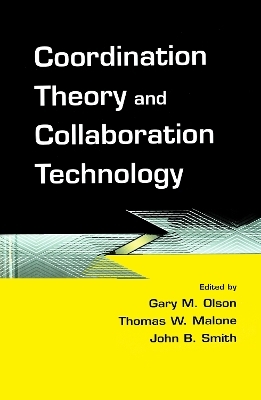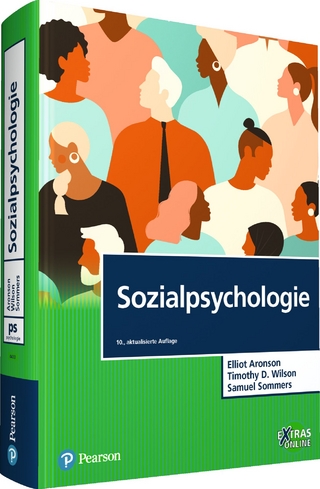
Coordination Theory and Collaboration Technology
Psychology Press (Verlag)
978-0-8058-3403-1 (ISBN)
The National Science Foundation funded the first Coordination Theory and Collaboration Technology initiative to look at systems that support collaborations in business and elsewhere. This book explores the global revolution in human interconnectedness. It will discuss the various collaborative workgroups and their use in technology. The initiative focuses on processes of coordination and cooperation among autonomous units in human systems, in computer and communication systems, and in hybrid organizations of both systems. This initiative is motivated by three scientific issues which have been the focus of separate research efforts, but which may benefit from collaborative research. The first is the effort to discover the principles underlying how people collaborate and coordinate work efficiently and productively in environments characterized by a high degree of decentralized computation and decision making. The second is to gain a better fundamental understanding of the structure and outputs of organizations, industries, and markets which incorporate sophisticated, decentralized information and communications technology as an important component of their operations. The third is to understand problems of coordination in decentralized or open computer systems.
Gary M. Olson, Thomas W. Malone, John B. Smith
Contents: Introduction. Part I: Theoretical Approaches to Coordination and Collaboration.T.W. Malone, K. Crowston, The Interdisciplinary Study of Coordination. R.J. Boland, Jr., R.V. Tenkasi, Communication and Collaboration in Distributed Cognition. E.H. Durfee, D. Damouth, P.J. Gmytrasiewicz, M.J. Huber, T.A. Montgomery, S. Sen, Coordination as Distributed Search. S. Kraus, J. Wilkenfeld, Strategic Negotiation in Multiagent Environments. T.W. Malone, K-Y. Lai, K.R. Grant, Two Design Principles for Collaboration Technology: Examples of Semiformal Systems and Radical Tailorability. T. Marschak, On Economies of Scope in Communication. S. Reiter, Knowledge, Discovery, and Growth. Part II: Collaboration Technology for Specific Domains.P. Dewan, V. Mashayekhi, J. Riedl, Infrastructure and Applications for Collaborative Software Engineering. C.A. Jasek, P.M. Jones, Cooperative Support for Distributed Supervisory Control. R. Furuta, P.D. Stotts, Trellis: A Formally Defined Hypertextual Basis for Integrating Task and Information. J. Pasquale, Problems of Decentralized Control: Using Randomized Coordination to Deal With Uncertainty and Avoid Conflicts. D.E. Shackelford, J.B. Smith, F.D. Smith, The Architecture and Implementation of a Distributed Hypermedia Storage System. Part III: Studies of Collaboration.R.C. Arkin, T. Balch, Communication and Coordination in Reactive Robotic Teams. G. Fischer, J. Grudin, R. McCall, J. Ostwald, D. Redmiles, B. Reeves, F. Shipman, Seeding, Evolutionary Growth, and Reseeding: The Incremental Development of Collaborative Design Environments. S.R. Hiltz, D. Dufner, J. Fjermestad, Y. Kim, R. Ocker, A. Rana, M. Turoff, Distributed Group Support Systems: Theory Development and Experimentation. R. Kling, K.L. Kraemer, J.P. Allen, Y. Bakos, V. Gurbaxani, M. Elliott, Transforming Coordination: The Promise and Problems of Information Technology in Coordination. C.M. Neuwirth, D.S. Kaufer, R. Chandhok, J.H. Morris, Computer Support for Distributed Collaborative Writing: A Coordination Science Perspective. G.M. Olson, J.S. Olson, Technology Support for Collaborative Workgroups. Part IV: Organizational Modeling.T. Berger, N.M. Kiefer, Central Coordination of Decentralized Information in Large Chains and Franchises. K.M. Carley, Organizational Performance, Coordination, and Cognition. R.E. Levitt, Y. Jin, G.A. Oralkan, J.C. Kunz, T.R. Christiansen, Computational Enterprise Models: Toward Analysis Tools for Designing Organizations. C. Lewis, R. Reitsma, E.V. Wilson, I. Zigurs, Extending Coordination Theory to Deal With Goal Conflicts. W-P. Wang, D.L. Kleinman, P.B. Luh, Modeling Team Coordination and Decisions in a Distributed Dynamic Environment. Part V: Collaboratories.G.C. Bowker, S.L. Star, Social Theoretical Issues in the Design of Collaboratories: Customized Software for Community Support Versus Large Scale Infrastructure. H. Chen, B.R. Schatz, A Path to Concept-Based Information Access: From National Collaboratories to Digital Libraries. G.M. Olson, D.E. Atkins, R. Clauer, T. Weymouth, T.A. Finholt, A. Prakash, C. Rasmussen, F. Jahanian, Technology to Support Distributed Team Science: The First Phase of the Upper Atmospheric Research Collaboratory (UARC).
| Verlagsort | Philadelphia |
|---|---|
| Sprache | englisch |
| Maße | 152 x 229 mm |
| Gewicht | 1224 g |
| Themenwelt | Geisteswissenschaften ► Psychologie ► Sozialpsychologie |
| Wirtschaft ► Betriebswirtschaft / Management ► Planung / Organisation | |
| ISBN-10 | 0-8058-3403-6 / 0805834036 |
| ISBN-13 | 978-0-8058-3403-1 / 9780805834031 |
| Zustand | Neuware |
| Haben Sie eine Frage zum Produkt? |
aus dem Bereich


